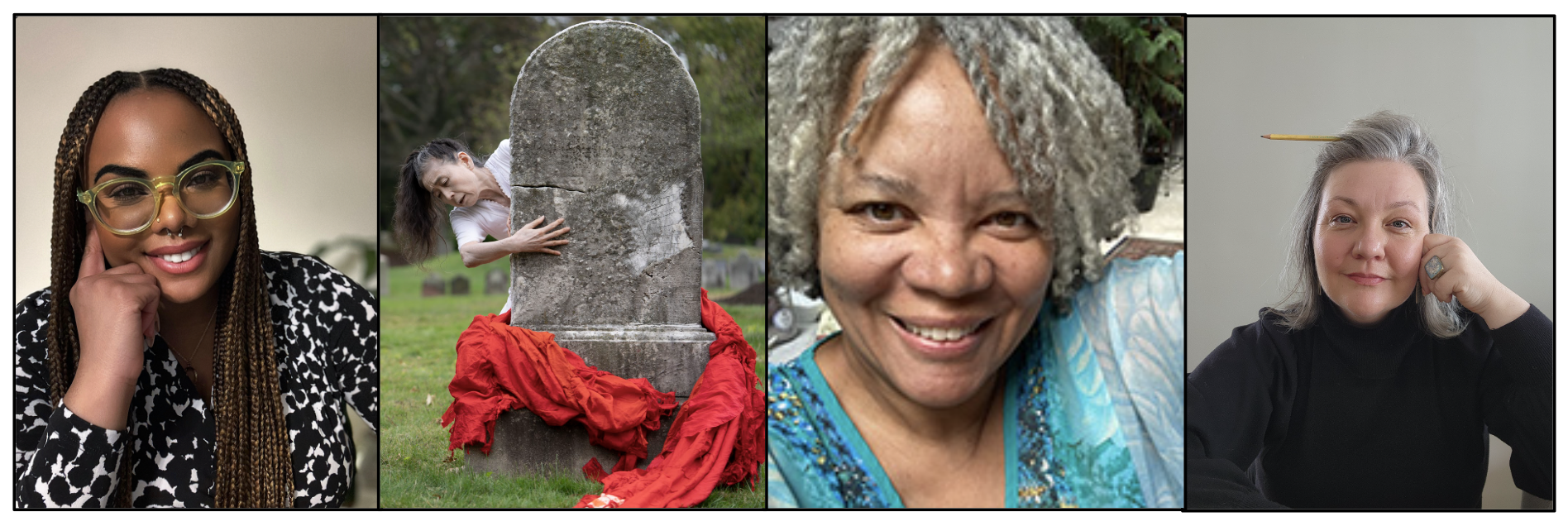Paneled by Saharra Dixon, Eiko Otake, Krista Nelson & Narinder Bazen, pictured from left to right
Pay-What-You-Wish
Laurel Hill West, Conservatory
-
Just as in life, dying is not only an individual experience but one that’s part of an interlocking framework of systems often driven by profit and power. The current deathcare industry in the U.S. reinforces systemic inequities based on class, race, ethnicity, ability, sexual orientation and gender identity, and centers dominant Western ideas of how aging, dying, and grieving should look.
What could it look like to decolonize or undo the ideas and practices that privilege medicalized and commercialized ways of dying? What are the values, rights, and ancestral knowledge-ways that can help us re-envision and re-shape deathcare so that everyone has access to an autonomous and dignified death? What are the holistic ways we might reclaim human-centered, community-based practices that support an interconnected culture of dying that is just, equitable, and ecologically sustainable? Join Saharra Dixon, Eiko Otake, Krista Nelson and Narinder Bazen for a discussion that envisions the future of dying and deathcare.
-
Saharra Dixon is a Black, queer Health Education Specialist, digital and performance-based storyteller, health equity researcher, and nonprofit leader dedicated to decolonizing public health. With a passion for mental health, chronic illness, and reproductive justice in minoritized communities, she weaves creativity and narrative into her work—unearthing the fundamental causes of health inequity and imagining healthful futures. A PhD Candidate in Public Health at the University of Massachusetts Amherst, Saharra also holds an MA in Educational Theatre from New York University and a BS in Health Behavior Science from the University of Delaware. She is trained in psychodrama, sociodrama, Theatre of the Oppressed, and death doula care, using these methods to explore mental health, grief, identity, and liberation. Saharra is a board member of the Collective for Radical Death Studies and serves as the organization’s Education and Outreach Co-Chair.
-
Born and raised in Japan and a resident of New York since 1976, Eiko Otake is a movement-based, interdisciplinary artist. She worked for more than 40 years as Eiko & Koma creating numerous performance works. Eiko has worked on the theme of death and dying for a long time, i.e. River (1995-1999), post-9/11 Offering (2002), Death Poem (2005) and Mourning (2007). More recently, in the historic Green-Wood Cemetery in Brooklyn, she has presented A Body in a Cemetery (2020), Mother (2022), With the Dead (2022) and stone (2023). She has also performed in Maplewood Cemetery in Durham, NC and Evergreen Cemetery in Colorado Springs, CO. Eiko is currently working on her 10-year project, I Invited Myself (2022–), a series of exhibitions and screenings of her media works. Its Volume 3 was presented in Philadelphia in 2024 at Asian Arts Initiative and The Fabric Workshop and Museum.
-
Krista Nelson bridges the gap between people and the natural world through ritual, language, and deep listening. As founder of Nature as Lover, she invites participants to speak with trees, listen to water, and enter in relationship with the living earth. Krista is a kikehwèt hitkwike, a healer among the trees or ecotherapist with the Philadelphia Ecotherapy project and the Fairmount Park Commission. She honors her Lenape ancestry through weekly Lenape language study under the guidance of the Lenape Nation of Pennsylvania and has recently become an official luwensu wintemakwi, a Lenape language teacher. Krista enjoys playing Native American-style flutes and creating sacred talismans on a canvas of Native American finger weaving. She says both flute and weaving tell the untold stories of her ancestors. She lives in Philadelphia with her five children and six grandchildren.
-
Narinder Bazen is an artist and death midwife whose work centers the intersections of death education, creativity, and cultural healing. She is the founder of the Nine Keys Death Midwifery Apprenticeship, a nine-month program that has supported over 100 practitioners in building meaningful, artful, and subversive deathcare practices. With a background in intuitive guidance and a deep commitment to collective healing, Narinder approaches death work as both a spiritual calling and a site of cultural transformation. She sees death midwifery as a form of culture midwifery—an act of resistance in a death-phobic society, and a call to reclaim humanity through living in death awareness.


